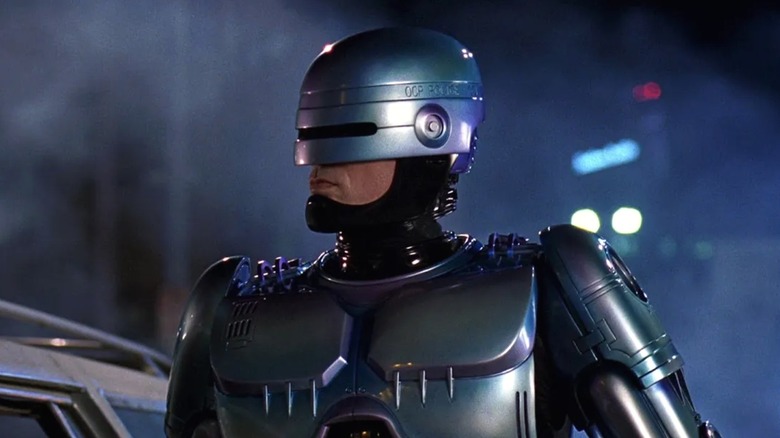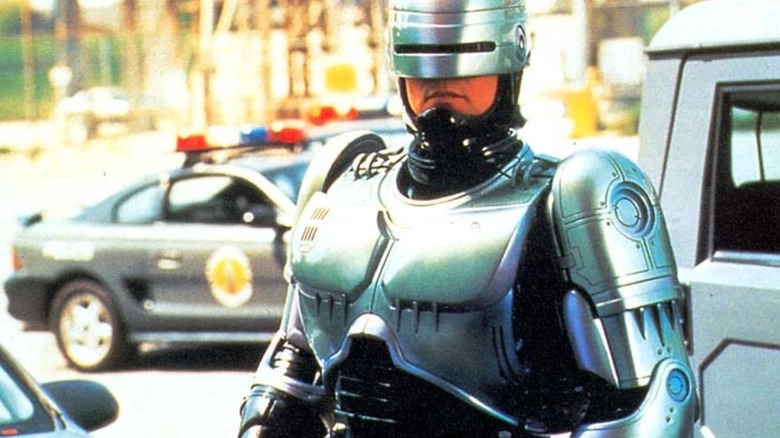Peter Weller's RoboCop Led To A Kid-Friendly Spin-Off Series You Forgot Existed
Paul Verhoeven's ultraviolet cult classic, "RoboCop," is flashy and grandiloquent for a reason. It is a pointed critique of 1980s America and its obsession with military-coded machismo, along with the cartoonish excess coveted by the greedy and corrupt. It is a film that promptly identifies the rot of megacorporations taking over a cityscape — in this case, Detroit — which is defined by unchecked crime and capitalism gnawing at its identity from the inside.
So when Detroit cop Alex Murphy (Peter Weller) is left for dead by mobsters, the titular RoboCop technology aids in the creation of a cyborg officer, built to be ruthlessly efficient without even risking the possibility of death. While unleashing a Frankensteinian monster in streets overrun with corruption isn't such a grand idea, Murphy's lingering humanity (and the agony of his final moments) cling to his reborn steel body, redefining the kind of hero America needs.
A chunk of these themes, of course, unfurl in a gloriously satirical vein, quietly underlining the anxiety surrounding a terrible and uncertain future. "RoboCop" eventually bloomed into a full-fledged franchise, leading up to a new television series that is currently in the works (courtesy of Amazon), which intends to revisit the core premise of Verhoeven's film from a fresh lens. The irony of a megaconglomerate leveraging this premise (which is a scathing indictment of rampant consumerism) to stretch a franchise that has already been milked beyond belief is not lost.
Speaking of the "RoboCop" franchise being leveraged for profit, you might not remember the eponymous kid-friendly (!) television series that was released in 1994. Yes, we have a "RoboCop" series that completely lacks the gore-adjacent graphic violence of Verhoeven's original and its critically maligned sequel. What does such a story argue in favor of, and does it even bother to honor the legacy of its predecessors? Let's investigate.
This dialed-back version of RoboCop can be fun, but is thematically defanged
In March 1994, Edward Neumeier & Michael Miner's "RoboCop" series premiered with a two-part, 89-minute pilot. The intent was clear from the get-go: this new series would ignore major events established in the film's timeline, along with the more violent DNA of the first two installments. It does, however, draw heavily from the films in terms of its satirization of commercial culture (a wild Roddy Piper even appears in an episode as Commander Cash!), but plays coy about everything else that "RoboCop" staunchly critiques. Even though the show's demographic was largely limited to children and young adults, there was ample opportunity to infuse these dialed-back storylines with nuance and conviction. Regrettably, this particular "RoboCop" comes across as hollow as the vision of consumerist America that Verhoeven brilliantly lampoons.
If you think I'm exaggerating, let's take a quick look at the premise. For starters, the series was made in lieu of a fourth "RoboCop" film, as Orion Pictures reasoned that a series aimed at a younger audience would draw less unfavorable comparisons to the 1987 original. This is also why a chunk of franchise canon was ignored, and the series renamed characters to distinguish them from their movie counterparts due to copyright issues (for instance, Yvette Nipar's Detective Lisa Madigan is blatantly based on Nancy Allen's Anne). The core premise is more or less the same, with the titular RoboCop (Richard Eden) taking down Big Bads on a per-episode basis, while the story introduces new characters to flesh out this new direction. However, none of these revamped characterizations work within the context of what a "RoboCop" television series is supposed to feel like.
There are a few things that do work well, such as Murphy's father gradually contending with the truth about his deceased son, which opens discussions about the human-cyborg divide, and whether it matters when you love someone. That said, the series' overall vibe feels terribly restrained and dated, as if completely removed from the timeless, prescient roots that it desperately wishes to leave behind. No amount of fun explosions and (non-fatal) shootouts can inject the "RoboCop" series with verve or depth, which is a shame, to say the least.

